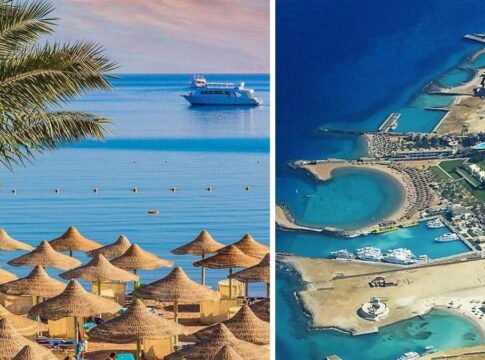The Red Sea cities of Hurghada and Sharm El-Sheikh have been named among the Top 15 Trending Global Summer Destinations in Mastercard’s Travel Trends 2025 report—solidifying Egypt’s place as a rising force in both leisure and experiential travel markets.
The annual study, published by the Mastercard Economics Institute (MEI), tracks global consumer spending and mobility patterns, offering a real-time snapshot of where—and why—travelers are going post-pandemic.
According to the report, travelers are now seeking “meaningful, memory-rich journeys” that prioritize nature, wellness, food, and regional connection, reshaping the competitive landscape of the Eastern Europe, Middle East, and Africa (EEMEA) travel corridor.
Egypt’s coastal cities stand at the intersection of several high-growth travel trends identified by the MEI, including:
- Wellness-driven escapes, particularly favored by affluent Gulf and European travelers seeking eco-retreats, spa experiences, and marine activities.
- Nature-first destinations, with coral reefs, desert landscapes, and sustainable lodges drawing environmentally conscious visitors.
- Gastronomic tourism, as global attention turns to the region’s evolving culinary identities.
“Hurghada and Sharm El-Sheikh have long attracted sun-seekers, but we’re now witnessing a deeper shift toward purpose-led travel,” said Dr. Rana El-Khouly, a regional tourism consultant at the Egyptian Center for Policy & Strategy (ECPS). “Visitors are increasingly drawn to destinations that offer rejuvenation, authenticity, and climate-conscious value.”
Egypt’s Ministry of Tourism is currently fast-tracking licensing for eco-lodges, wellness resorts, and culinary tours across the Red Sea coast to align with emerging global demand.
The Mastercard report highlights a surge in intra-regional travel across the Middle East and Africa. Saudi Arabia, for example, is quickly rising as a leisure destination in its own right—reflecting a broader appetite for “accessible, regional escapes.”
Egyptian officials see this as an opportunity, not a threat.
“Egypt has the infrastructure, cultural depth, and natural assets to not just retain tourists but become the anchor of multi-country travel circuits in the Middle East,” said Omar Selim, an advisor to the Ministry of Civil Aviation.
With new direct routes to Gulf cities, visa-on-arrival policies for select nationalities, and strategic tourism agreements under negotiation with Saudi Arabia and the UAE, Egypt is actively repositioning itself as a regional gateway for leisure and business travelers alike.
While traditional tourism pillars remain strong, Egypt is now expanding into new verticals:
- Business travel within EEMEA is rising as companies shift away from long-haul trips. Egypt’s improved digital infrastructure, convention spaces, and central geography make it increasingly appealing for conferences and hybrid work retreats.
- Culinary tourism is being rebranded by young Egyptian chefs blending heritage with innovation. Though Istanbul topped MEI’s list of “globalized foodie cities,” Egypt’s emerging food scene is drawing attention across the region.
“Food is identity, and Egypt has the opportunity to lead a culinary revival that complements its hospitality sector,” said Yasmine Farouk, a Cairo-based food anthropologist and contributor to the Arab Gastronomy Forum.
Khatija Haque, MEI’s Chief Economist for EEMEA, underscored the deeper behavioral trends: “While global events and currency fluctuations play a role, what stands out is that people are still investing in experiences that enrich their lives.”
That aligns with Egypt’s own Tourism Diversification and Sustainability Agenda 2030, which prioritizes green-certified hotels, cultural preservation, and inclusive economic development—especially in coastal and desert regions.
With its Red Sea resorts now climbing global travel rankings and regional dynamics shifting in its favor, Egypt is positioned to lead a post-pandemic tourism renaissance—balancing leisure, wellness, business, and cultural authenticity.
As the world turns toward experience-driven travel, Egypt’s greatest asset may no longer be its past—but its ability to curate the future of tourism in the Middle East.


